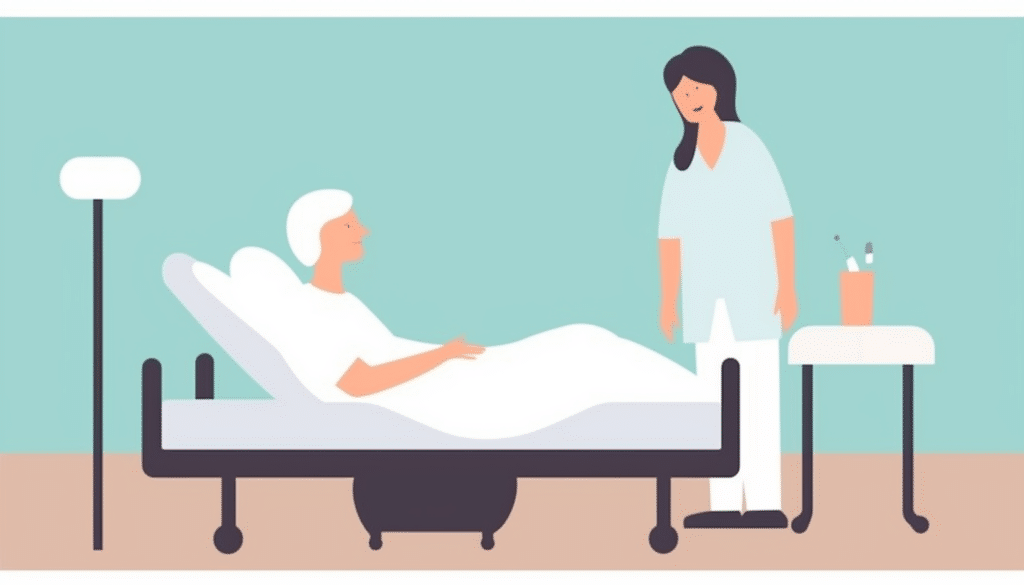Hospitals normally accept all patients that have health insurance.
Only a doctor can authorize hospitalization for a non-emergency condition. It’s possible that patients may not be treated in the hospital by the doctor who has been treating them and who referred them to the hospital. This depends on the circumstances surrounding the hospitalization and whether or not the referring doctor is a member of the hospital staff.
Germany is becoming increasingly concerned about the high cost of their health care system and, among other things measures have been introduced to cut the length of hospital stays. Nevertheless, a stay in a German hospital can be longer than stays in other countries. New mothers, for example, average six days in a German hospital compared to one or two days, barring complications, for those who stay in an American hospital.
Germans are not so concerned with privacy as are others. You probably won’t be issued a gown during examinations, and there are usually no curtains around the beds. So bring a nightgown or pajamas and a bathrobe. Nor do German hospitals very often issue towels. You are expected to bring your own. Other items it is wise to bring: slippers, soap, toilet articles and a washcloth. Don’t take too much, though, as storage space is tight.
Meals and mealtimes at hospitals conform to what’s usual in Germany. That big, hot meal of the day is served at midday rather than evening. Breakfasts will be rolls or bread with jam, honey, meat or cheese, while suppers will generally be bread, sausages, cottage cheese and tea. Supper is usually served early, perhaps even at 4:30. You are often given a choice of menus for your meals, and unless you’re on a special diet you may keep your own food and (non-alcoholic) drink.
Visiting hours are usually from about 2 to 8 p.m., and German hospitals frown on visits by small children. You can get away with it, though, as long as other patients aren’t disturbed. One parent usually can spend the night with a hospitalized child.
Smoking is prohibited in patient rooms. Patient rooms usually have two to four beds, and your roommates will always be of the same sex. Depending on they type of insurance coverage you have you can be assigned a private or semi-private room.
On departing from the hospital it is customary to leave a small consideration for the nursing staff. Fruit baskets, candy or baked goods will fill the bill, as will a “thank-you” card and €5 or €10 for the “coffee fund.”
For information on the hospital bill is paid, see the separate article on Paying Medical Expenses and Insurance Claims.
German Medical Vocabulary
If the old stand-by’s Ich spreche kein Deutsch (I don’t speak German) and Sprechen Sie Englisch? (Do you speak English?) aren’t working, the following list of German words and phrases may help.
General
| Can I have something for the pain? | Kann ich etwas gegen die Schmerzen haben? |
| Will it hurt? | Wird es weh tun? |
| Do I need stitches? | Muss ich genaeht werden? |
| Do I have to be admitted to the hospital? | Muss ich stationaer aufgenommen werden? |
Family History of Illnesses (Erkrankungen in Der Familie)
| Cardiac infarction | Herzinfarkt |
| High blood pressure / Stroke | Hoher Blutdruck / Schlaganfall |
| Diabetes | Diabetes (Zuckerkrankheit) |
| Infectious diseases | Infektionskrankheiten |
| Asthma / Allergies | Asthma / Allergie |
| Hereditary diseases (e.g. hemophilia) | Erbkrankheiten (z. Z. Bluter) |
My Previous Illnesses (Meine Vorerkrankungen)
| Hay fever | Heuschnupfen |
| Asthma | Asthma |
| Other allergies | Sonstige Allergien |
| Pneumonia / pleurisy | Lungen- / Rippenfellentzuendung |
| Pulmonary tuberculosis | Lungentuberkulose |
| Other diseases of the respiratory system | Sonstige Erkrankungen der Atemwege |
| Tendency to circulatory collapse | Neigung zu Kreislaufkollaps |
| High / low blood pressure | Hoher / niedriger Blutdruck |
| Angina pectoris/tachycardia | Herzangstsyndrom oder Herzjagen |
| Weak heart | Herzschwaeche |
| Other diseases of the cardiovascular system | Sonstige Erkrankungen von Herz- und Kreislaufsystem |
| Gastric or duodenal ulcer / gastritis | Magen- oder Zwoelffingerdarm- geschwuer / Gastritis |
| Pancreatitis | Bauchspeichel- druesenentzuendun |
| Jaundice or liver diseases | Gelbsucht oder Leberkrankungen |
| Gallstones | Gallensteine |
| Other diseases of the gastro-intestinal system | Sonstige Erkrankungen des Magen- Darm- Traktes |
| Kidney stones | Nierensteine |
| Inflammation of the renal or urinary tract | Entzuendung der Nieren oder Harnwege |
| Venereal diseases | Geschlechtskrankheiten |
| Phlebitis / thrombosis / embolism | Venenentzuendungen / Thrombose / Embolien |
Child's Previous Illnesses (Vorerkrankungen Des Kindes)
| German measles | Roeteln |
| Chicken pox | Windpocken |
| Measles | Masern |
| Scarlet fever | Scharlach |
| Whooping cough | Keuchhusten |
| Mumps | Mumps |
| Diphtheria | Diphtherie |
| Tuberculosis | Tuberkulose |
| Frequent ear inflammations | Haeufige Ohrenentzuendungen |
| Frequent sore throats | Haeufige Halsentzuendungen |
| Frequent disorders of the urinary tract / bladder inflammations | Haeufige Harnwegs-affekte / Blasenentzuendungen |
| Convulsions with / without fever, so far ___ times | Krampfanfaelle mit / ohne Fieber, bisher ___ mal |
| Heart defect | Herzfehler |
| The child is now on the following drugs: ________ times/daily/weekly | Derzeit werden folgende Medikamente verabreicht taeglich/woechentlich ___ mal |
My Present Symptoms (Meine Gegenwaertigen Beschwerden)
| I have a pain here (point) | Ich habe hier Schmerzen (point) |
| (Terrible) back pain | (Starke) Rueckenschmerzen |
| I feel tired / faint | Ich fuehle mich muede / schwach |
| It hurts when I swallow | Ich habe Schluckbeschwerden |
| I can’t hear very well | Ich bin schwerhoerig |
| I can’t see very well | Ich habe Sehbeschwerden |
| I’ve had a temperature of ___ oC for ___ days | Ich habe ___oC Fieber seit ___ Tagen |
| I have a cold | Ich bin erkaeltet |
| I have a (terrible) headache | Ich habe (starke) Kopfschmerzen |
| I have a headache with nausea / flickering in front of my eyes | Ich habe Kopfschmerzen mit Brechreiz / Augenflimmern |
| I have spells of dizziness / fainting | Ich habe Schwindel- / Ohnmachtsanfaelle |
| I have pains in my limbs | Ich habe Gliederschmerzen |
| I have pains in my eyes | Ich habe Augenschmerzen |
| I have an earache in one / both ears | Ich habe Schmerzen in einem Ohr / beiden Ohren |
| I have been coughing with / without sputum for ___ days | Ich habe Husten mit / ohne Auswurf weit ___ Tagen |
| I am coughing up blood | Ich huste Blut |
| I sometimes / always have trouble breathing | Ich leide zeitweise / dauernd an Atemnot |
| I have breathing pains | Ich habe Schmerzen beim Atmen |
| I have discomfort / pressure feeling / pains in my chest | Ich leide an Unbehagen / Druckgefuehl / Schmerzen in der Brust |


























